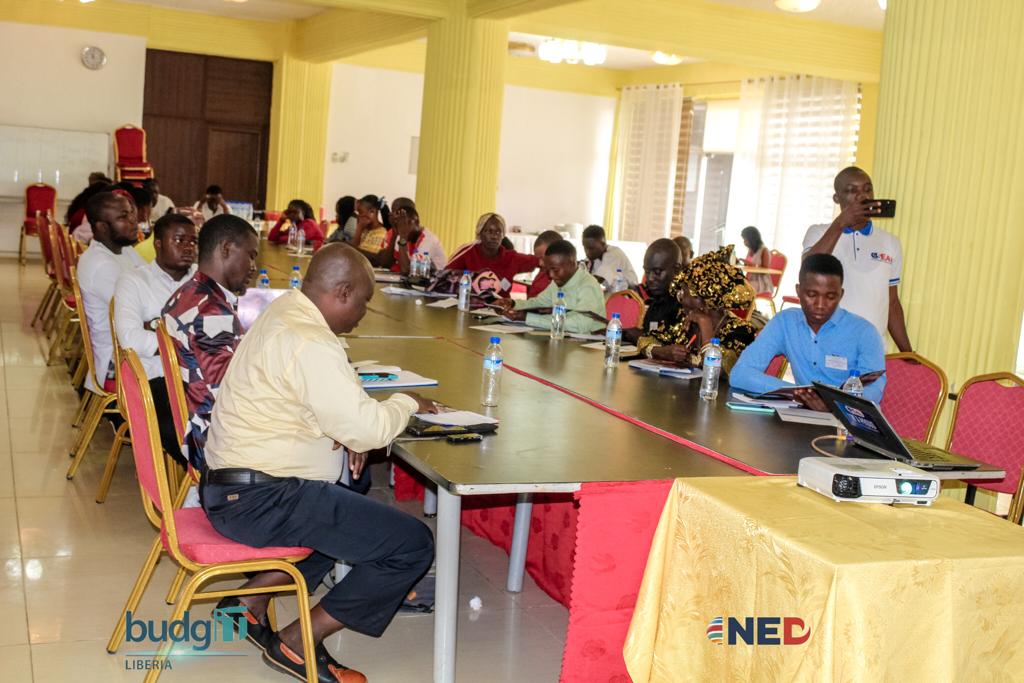From establishing partnerships with the Liberia Budget Office to carrying out budget outreach programs in new communities to developing a Health Sector Accountability report to improve the delivery of health services in Liberia, BudgIT had a busy yet rewarding year.
Budget Access Project
In 2022, BudgIT Liberia accelerated programs to empower citizens with information to demand government accountability and service delivery. In line with our core mission and with funding support from the National Endowment for Democracy, we seek to enhance Liberians’ knowledge of the national budget by visiting new communities, hosting radio shows, and having lively conversations on social media about the 2022 national budget.
We simplified the 2022 national budget to enhance citizens’ knowledge of budgets and public finance data, allowing them to take action within their communities. BudgIT Liberia identified frivolous provisions in the budget and raised conversations around them, encouraging citizens, the media, and the CSOs’ monitoring roles. We uncovered $3 million (USD) in legislative engagement funds designated for legislator visits to their counties, which sparked concern for citizens and the media. We observed increased participation in the budget conversation with increased phone calls into hour-long weekly radio programs on FrontPage 99.5 Africa and OK FM.
Through our budget awareness activities at our numerous town hall meetings in our implementing counties, including Bong, Margibi, and Grand Bassa, we engaged over 5,000 citizens. We produced 26 radio discussion shows to facilitate discussions around the 2022 budget. In 2022, we held a Budget Monitoring Workshop with over 25 participants, introducing TRACKA, our budget monitoring platform, to stakeholders to show how the tool can facilitate project implementation in the country.
COVID-19 Transparency and Accountability Project (CTAP)
In implementing the second phase of the COVID-19 Transparency and Accountability Project (CTAP), we traced the funds donated to Liberia through international and national organizations to help combat the epidemic by engaging different stakeholders and sharing our findings with the public to enhance transparency and accountability and also raise critical recommendations to improve the health sector and the country’s emergency preparedness.
An essential part of our work is to empower citizens with knowledge and information to facilitate societal change. Through CTAP, we used social media, town hall meetings, and radio conversations in five communities (Montserrado, Bong, Margibi, Grand Bassa, and Grand Cape Mount Counties) to get people to demand high-quality healthcare services. To promote inclusiveness, we brought together several stakeholders, including civil society organizations, the Muslim and Christian communities, and youth and student organizations, to gather their input for the Health Sector Accountability Research Report. We worked with the Open Government Partnership (OGP) to ensure the findings and recommendations in the HSA report are incorporated into Liberia’s National Action Plan 2023–2024.
While implementing CTAP, we observed that many citizens, including key stakeholders in the health sector and healthcare workers, were unaware of the provisions donated to manage the COVID-19 pandemic, which presents a challenge to the efficient use of the resources. We want to raise public awareness of the importance of promoting accountability in the health sector. As we actively pursue partnerships with the Ministry of Health, BudgIT Liberia will lead advocacy for increased allocation to the industry and provide detailed information about the budget provisions for citizen monitoring.
Citizen apathy and government mistrust impede our work, making it difficult for citizens to get involved and demand good governance in Liberia. While we share budgetary knowledge, we want to see citizens actively demanding accountability and service delivery. However, we observed that due to the current hardships lingering from a weak economy still struggling to recover from the COVID-19 pandemic, many do not believe that the government can or is willing to do anything to improve their living conditions. We will continue to engage citizens and encourage them to ensure the efficient use of taxes by engaging their public representatives and participating in budgeting.
The lack of knowledge about the budgeting process and citizens’ inability to demand quality service delivery from their leaders through budgetary allocations made it difficult for us to find citizens interested in participating in Liberia’s budgeting process, through which citizens can promote transparency and accountability.
Institutional Engagement
In 2022, we engaged the Legislative Budget Office (LBO) at the national legislature. We supported them by developing a website to enhance budget transparency and support their mandate to create citizen-friendly budgets. We will continue to prioritize these strategic partnerships to increase our output and achieve our mandate.
Our 2023 Plans
We will actively collaborate with communities and other organisations to inform the public about the value of participatory governance and to give them a better understanding of the Liberian budgeting process.
